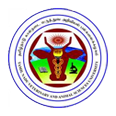- The Bioinformatics Centre at Madras Veterinary College has been identified as one such node in the network which was established in the year 1990-1991 to cater to the needs of scientists of Veterinary, Animal and Fishery Sciences in the field of Bioinformatics and Biotechnology.
- The Centre has been providing computational facilities, bioinformatics –related services to its users. The hardware, software and the expertise available at this centre facilitate the users in every possible way. The centre is equipped with state-of-art services and facilitates information storage and retrieval and an in-house wetlab to carry out molecular biology works.
- Major activities of the centre include human resource development, research, information retrieval, database creation etc.,
- Two PG courses namely, M.Sc., Bioinformatics and PG Diploma in Bioinformatics are being offered at this centre.
- The centre is carrying out research in the area of Drug discovery/docking, lead optimization, Epitope prediction, Microarray Analysis, Pathway Analysis, Database creation, Modelling and Comparative Genomics etc.
- To act as a node for acquisition and dissemination of information related Biotechnology and allied subjects
- Building up database and information sharing in the related areas of Biotechnology and allied science
- To conduct periodical training programs in the field of Bioinformatics and information retrieval system to research scholars and students
- To offer students projects to the internal and external students from various universities in the area of Bioinformatics
- To have research collaboration with scientific companies dealing with Biotechnology, Bioinformatics and allied sciences
- To develop databases on herbal active principles act upon various disease / altered physiological conditions
- To create database on primers developed and genes sequenced by the staff and students in various departments of TANUVAS for degree program and also for funded research projects
- Mycobacterium tuberculosis strain CBE-6 gyrase B (gyrB) gene, partial cds [Accession No. EU835533]
- Mycobacterium tuberculosis strain CBE-7 gyrase B (gyrB) gene, partial cds [Accession No. EU835534]
- Mycobacterium tuberculosis strain CBE -8 gyrase A-like (gyrA) gene, partial sequence. [Accession No. EU835535]
- Information Retrieval Package (IRP)
- Student Relational Database Management System (SRDBMS)
The primary impact of this centre is manpower training in Bioinformatics at various levels includes Professors, Lecturers, Scientists, Post Graduates etc., from various institutes of India. 1320 participants were trained in 66 trainings/workshops conducted since 1999. The Sub-DIC is assisting research scholars and scientists from neighboring institutes in updating their knowledge in bioinformatics offering projects in Bioinformatics through Bioinformatics resources available in the centre. So far, 96 external student research projects have been completed

